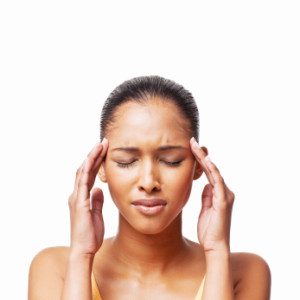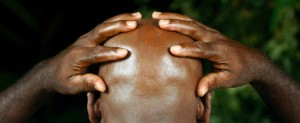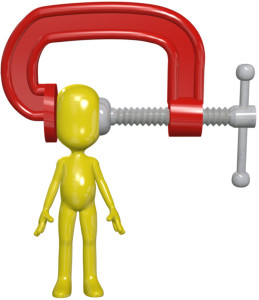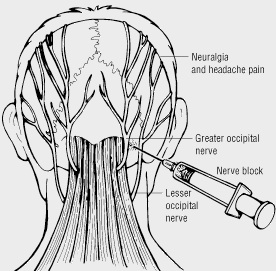MIGRAINE HEADACHE, CLUSTER HEADACHE, TENSION HEADACHE
There are several different types of headaches: migraine headaches (including ocular migraines), cluster headaches, headaches that include neck and shoulder pain, and the regular everyday stress headache (tension). While different kinds of headaches can mean  different kinds of pain and treatments, there are typically four main reasons why a person would get a headache:
different kinds of pain and treatments, there are typically four main reasons why a person would get a headache:
- spasms in the head and neck muscles
- changes in the diameter of the blood vessels in the head and neck
- misalignment or misplacement of the head and neck structure
- inflammation in the head and neck
Each of those reasons could have multiple causes. For instance, spasms in the head or neck could be because you slept wrong, and strained a muscle. Or it could be due to a minor whiplash injury. Changes in the diameter of the blood vessels might be caused by something as simple as dehydration, or it could be a symptom of a stroke.
MIGRAINE HEADACHES
There are certain types of headaches that are more serious than your typical “once in a while” regular headache. Migraine headaches are one type of common headache that can be very serious, and very debilitating. According to the National Headache Foundation, approximately 30 million Americans suffer from Migraines, which is over 10% of adults. Most individuals have a family history of migraine headaches.
The pain of a migraine can be severely intense. Symptoms include a disabling pulsing or throbbing of the head, a sharp sense of stabbing pain behind the eyes, a severe sensitivity to light, nausea, pressure in the neck or spine, and sometimes even visual disturbances like auras.
For many migraine sufferers, these types of intense headaches can last for days. While under a migraine attack, many are unable to function and participate in normal everyday life.
It was once thought that abnormal blood vessels were to blame for this painful condition. However, new studies show that the 30 million Americans who suffer from migraines might actually have a unique electrical disorder of brain cells.
The study explained the results: “Experiments in which scientists use a powerful magnet to stimulate neurons provide startling evidence that some people’s brains are predisposed to hyperexcitability. When people prone to migraines were stimulated, they literally saw spots similar to a migraine’s aura. One even went into a migraine as spellbound scientists watched. But when people who don’t get migraines were stimulated, their neurons weren’t affected.” (“Migraine; Science Points to Unique Electrical Disorder of Brain Cells.” Pain & Central Nervous System Week. 01 Jul. 2000: 2425)
Call (602) 507 – 6550 to schedule your Appointment TODAY!

THE CLUSTER HEADACHE
Another type of severely disabling headache is the “cluster headache.” Cluster headaches are reported to be the most  painful and severe of all headaches. They are usually confined to one specific side or area of the head (hence the name “cluster headache”) and are excruciating in nature.
painful and severe of all headaches. They are usually confined to one specific side or area of the head (hence the name “cluster headache”) and are excruciating in nature.
Cluster headaches differ than migraines in that the onset is rapid, and they usually only last a couple of hours. Typically the pain is located on the temples, and is accompanied by one of the following additional symptoms: ptosis (drooping eyelid), miosis (constriction of the pupils) conjunctival injection (redness of the conjunctiva), lacrimation (tearing), rhinorrhea (runny nose and nasal stuffiness), and, occasionally facial blushing, swelling, or sweating – all of which appears on the same side as the pain. (“Tailoring Treatment to Headache Type.” Pulse. 05 Nov. 2005: 46)
Doctors are now finding that these types of headaches are more common in women than men, and that smoking and alcohol consumption plays a big part in triggering them.
TENSION HEADACHES
The most common type of headache is what’s sometimes called a “stress headache” or  tension headache. That could actually be caused by any number of triggers: stress, eye strain, dehydration, allergies, a minor cold, sensitivities to certain scents, fatigue, smoking, alcohol, loud noise and more.
tension headache. That could actually be caused by any number of triggers: stress, eye strain, dehydration, allergies, a minor cold, sensitivities to certain scents, fatigue, smoking, alcohol, loud noise and more.
These headaches, while annoying and at times possibly very painful, are usually not serious. They may be associated with sleep disturbance, difficulty concentrating or depression.
Usually tension headaches occur closer to day’s end. The upper neck and the back of the head are most commonly affected. One thing that separates tension headaches from migraines and cluster headaches is they are not caused by neurological abnormality.
Other Types of Headaches
Another type of headache is an ocular migraine. These specific types of migraines affect the eyes, causing vision loss, partial blindness, or a distortion of light and shadows. Ocular migraines are somewhat rare, affecting only one out of every 200 migraine sufferers.
Yet there is usually always some type of underlying cause: a pinched nerve, a tumor, eye spasms, a lack of blood flow or other physiological reasons.
Call (602) 507 – 6550 to schedule your Appointment TODAY!

Best Treatment Plan for Headaches
So what is the best treatment for headaches? For those who have no aversion to over the counter medications, an NSAID (non-steroidal anti-inflammatory drug, like Advil or Motrin) or Tylenol can usually relieve the pain. Sometimes, it’s as simple as removing oneself from the offensive situation, whether it be loud noise or a room full of strong perfume.
There are two types of treatments for headaches: Abortive or Preventive
Abortive treatment does not decrease the amount of headaches that occur, or the severity. But it can help substantially. It is very important for one’s headache doctor to balance the abortive and preventive treatments properly. Here are various treatments used for abortive therapy:
- Oxygen
- NSAID’s
- Ergots
- Opiates
- Triptans
- Anti-emetics
- Butalbital
Preventive treatments are designed to reduce the severity and frequency of headaches from occurring. They are typically used in conjunction with abortive treatments and include options such as:
- Antidepressants
- Antihistamines
- Antiseizure medications
- Cardiovascular drugs like beta blockers
There are multiple interventional pain treatments that have been shown to provide excellent results for various types of headaches. These may include:
excellent results for various types of headaches. These may include:
Arizona Pain Specialists offers all of the treatments mentioned and more.The pain clinics in Arizona offer medications for headaches, interventional treatments including injections and occipital nerve stimulation, chiropractic treatment, acupuncture, behavioral therapy, hormone supplements and physical rehabilitation.
Arizona offer medications for headaches, interventional treatments including injections and occipital nerve stimulation, chiropractic treatment, acupuncture, behavioral therapy, hormone supplements and physical rehabilitation.
Arizona Pain offers effective and customized treatment for all types of headaches.
Call (602) 507 – 6550 to schedule your Appointment TODAY!

![]()